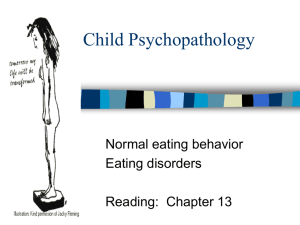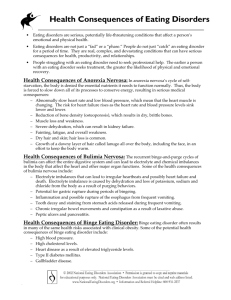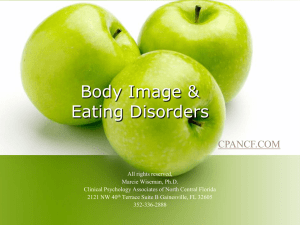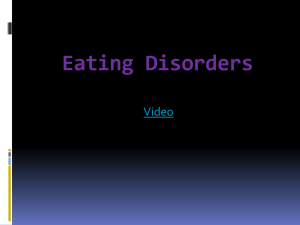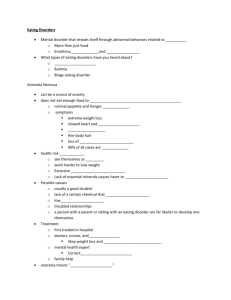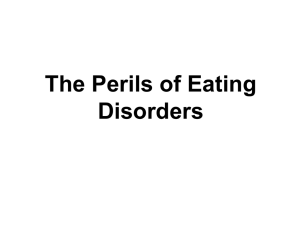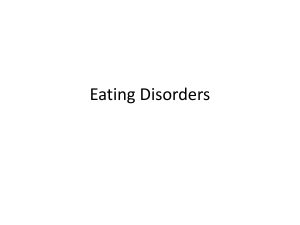Activity #26 Eating Disorders PPT 3
advertisement
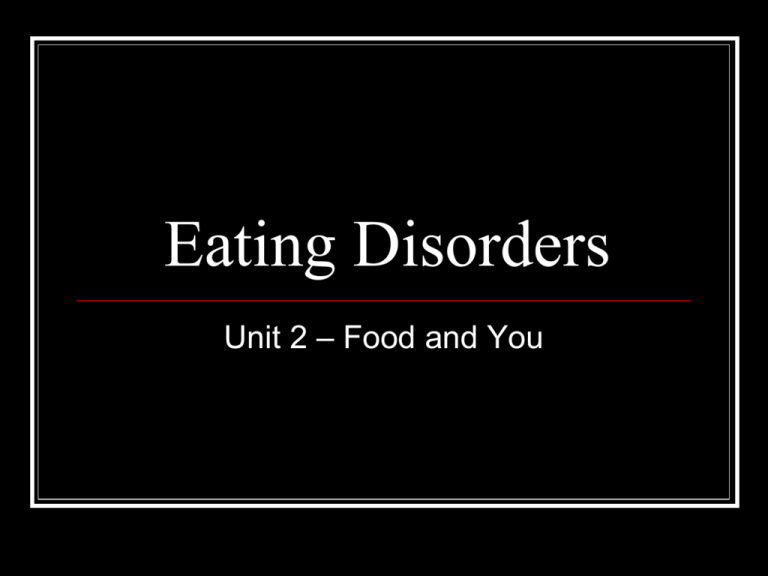
Eating Disorders Unit 2 – Food and You Brainstorm reasons that eating disorders are so prevalent in our society. For example, food is abundant, and certain body shapes are valued. What messages do the media give about food and physical beauty? Anorexia Nervosa Self-starvation Behavioral signs = obsessive exercise calorie and fat gram counting restriction of food persistent concern with body image Other Characteristics of Anorexia Incredibly sensitive of weight Massive fear of gaining weight Desire to control Effects of Anorexia Lowered heart rate, body temperature, constipation, lowered blood pressure and lowered breathing rate. 5-20% die from this disorder Health Consequences Muscle loss and weakness Slow heart rate and risk of heart failure Trouble sleeping Severe dehyrdation This is what they see… Bulimia Nervosa Binge eating then purging Regularly engages in strict diet plan diet pills compulsive exercise. Other Characteristics of Bulimia Hide a food stash and eat secretly Weight could fluctuate (but average) Effects of Bulimia Damages the esophagus, teeth, gums Constant sore throats Irregular heart beats, can lead to heart failure Health Consequences Tooth decay Constipation Faulty heartbeat Stomach ulcers Kidney problems Binge Eating Behavior Large amounts of food Characteristics of Bulimia Have an “addiction” to food Tend to be overweight and are aware of their abnormal eating habits Use food for comfort, and as a way to deal with all emotions Effects of Binge Eating Disorder Causes weight gain High blood pressure, high cholesterol levels, heart disease, diabetes, gallbladder disease Health Consequences Heart Disease Diabetes High Blood Pressure Gallbladder Disease Causes of Eating Disorders Psychological factors Relationships Ridicule of weight Abused Body Image Food to cope with emotions Unrealistic images of body shape/weight Chemistry Chemical imbalances in the brain Much is till to be learned in this area. Facts 77% report duration from 1 to 15 years 86% report onset of illness by the age of 20 10% = 10 years or younger 33% = ages 11-15 43% = ages 16-20 Only 50% report being cured 6% die Celebrities with Eating Disorders Paula Abdul Fiona Apple Courtney Cox Whitney Houston Courtney ThorneSmith Calista Flockhart Jane Fonda Audrey Hepburn Elton John Monica Lewinsky Kate Moss Elvis Presley Christina Ricci Richard Simmons Billy Bob Thornton Warning Signs Preoccupied with weight, weight loss, calories and food Going to the bathroom right after eating a meal Eating excessive amounts of food and not gaining weight An obsession to burn off calories Warning Signs Extreme weight loss Low-self esteem Perfectionism Signs of vomiting or laxative use Stealing, hiding, or hoarding food What can be done? Medical Nutrition therapy Behavioral therapy Cognitive behavioral therapy Family therapy Drug therapy Athletes and Eating Disorders Ballet and other dance Figure skating Gymnastics Running Swimming Rowing Horse Racing Wrestling
